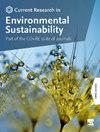可持续性作为社区领土内的美好生活和自然权利:生物中心立场、关系视角和本体认知多样性
IF 3.8
Q2 ENVIRONMENTAL SCIENCES
Current Research in Environmental Sustainability
Pub Date : 2025-01-01
DOI:10.1016/j.crsust.2025.100308
引用次数: 0
摘要
我们将Buen Vivir (BV)作为一个基于独特的本体-认知框架的综合建议进行研究,该框架可以为可持续发展提供替代途径。我们确定了可持续发展重新诠释的三个关键原则:从生物中心/生态中心的角度超越人与自然的鸿沟;和谐共存的关系视角,关于所有生命形式的交织;承认本体-认知的多样性,包括土著/地方世界观。这些原则可以通过两种战略来实现可持续性目的:确立自然权利和具有自治权的领土/社区实践。在承认全球适用性的局限性的同时,我们强调BV在认识间对话和与全球已经存在的变革社会运动(如去增长、粮食主权、社会和团结经济或生态女权主义)结盟方面的潜力。我们的分析批评了主流可持续性话语中固有的知识殖民性,例如隐含在可持续发展目标或地球极限背后的知识殖民性,倡导非殖民化,重视多元宇宙的不同世界观。本文章由计算机程序翻译,如有差异,请以英文原文为准。
Sustainability as Buen Vivir within a community-territory and the Rights of Nature: biocentric standpoints, relational perspectives and onto-epistemic diversity
We examine Buen Vivir (BV) as a comprehensive proposal based on a distinctive onto-epistemic framework that can offer alternative pathways towards sustainability. We identify three key principles of BV for sustainability reinterpretations: Transcendence of human-nature divide from a biocentric/ecocentric standpoint; Relational perspectives of coexistence in harmony, regarding the intertwiness of all forms of life; Recognition of onto-epistemic diversity including indigenous/local worldviews. These principles could be enacted for sustainability purposes via two strategies: establishing Rights of Nature, and territorial/communitarian practices with autonomy. While acknowledging limitations in global applicability, we emphasize BV's potential for inter-epistemic dialogue and alignment with transformative social movements already present around the globe, like degrowth, food sovereignty, social and solidarity economy or ecofeminisms. Our analysis critiques the coloniality of knowledge inherent in mainstream sustainability discourses like those implicit behind the sustainable development goals or planetary limits, advocating for decolonization and valuing diverse worldviews towards the pluriverse.
求助全文
通过发布文献求助,成功后即可免费获取论文全文。
去求助
来源期刊

Current Research in Environmental Sustainability
Environmental Science-General Environmental Science
CiteScore
7.50
自引率
9.10%
发文量
76
审稿时长
95 days
 求助内容:
求助内容: 应助结果提醒方式:
应助结果提醒方式:


